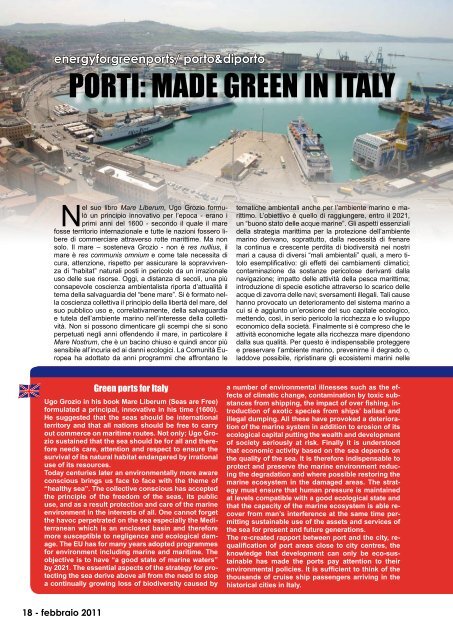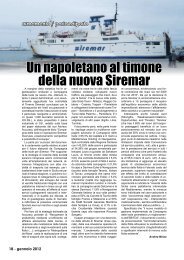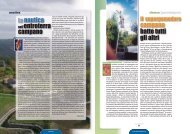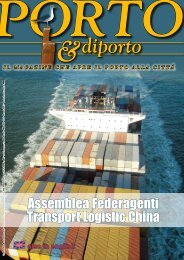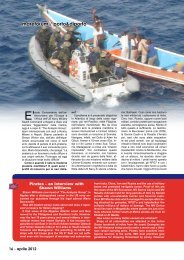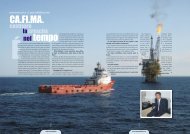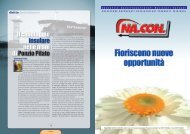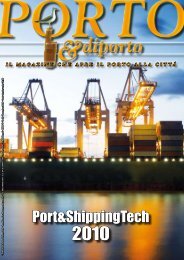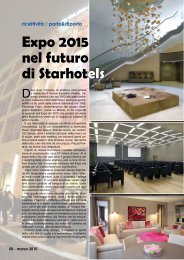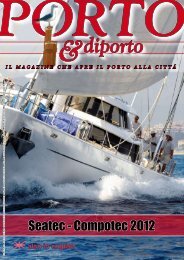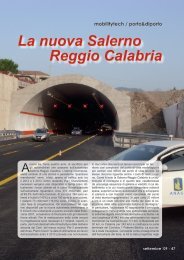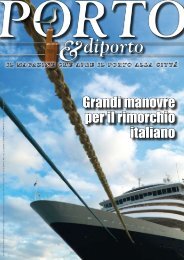energyforgreenports/ porto&<strong>diporto</strong>PORTI: MADE GREEN IN ITALYNel suo libro Mare Liberum, Ugo Grozio formulòun principio innovativo per l’epoca - erano iprimi anni del 1600 - secondo il quale il marefosse territorio internazionale e tutte le nazioni fossero liberedi commerciare attraverso rotte marittime. Ma nonsolo. Il mare – sosteneva Grozio - non è res nullius, ilmare è res communis omnium e come tale necessita dicura, attenzione, rispetto per assicurare la sopravvivenzadi “habitat” naturali posti in pericolo da un irrazionaleuso delle sue risorse. Oggi, a distanza di secoli, una piùconsapevole coscienza ambientalista riporta d’attualità iltema della salvaguardia del “bene mare”. Si è formato nellacoscienza collettiva il principio della libertà del mare, delsuo pubblico uso e, correlativamente, della salvaguardiae tutela dell’ambiente marino nell’interesse della collettività.Non si possono dimenticare gli scempi che si sonoperpetuati negli anni offendendo il mare, in particolare ilMare Nostrum, che è un bacino chiuso e quindi ancor piùsensibile all’incuria ed ai danni ecologici. La Comunità Europeaha adottato da anni programmi che affrontano letematiche ambientali anche per l’ambiente marino e marittimo.L’obiettivo è quello di raggiungere, entro il 2<strong>02</strong>1,un “buono stato delle acque marine”. Gli aspetti essenzialidella strategia marittima per la protezione dell’ambientemarino derivano, soprattutto, dalla necessità di frenarela continua e crescente perdita di biodiversità nei nostrimari a causa di diversi “mali ambientali” quali, a mero titoloesemplificativo: gli effetti dei cambiamenti climatici;contaminazione da sostanze pericolose derivanti dallanavigazione; impatto delle attività della pesca marittima;introduzione di specie esotiche attraverso lo scarico delleacque di zavorra delle navi; sversamenti illegali. Tali causehanno provocato un deterioramento del sistema marino acui si è aggiunto un’erosione del suo capitale ecologico,mettendo, così, in serio pericolo la ricchezza e lo sviluppoeconomico della società. Finalmente si è compreso che leattività economiche legate alla ricchezza mare dipendonodalla sua qualità. Per questo è indispensabile proteggeree preservare l’ambiente marino, prevenirne il degrado o,laddove possibile, ripristinare gli ecosistemi marini nelleGreen ports for ItalyUgo Grozio in his book Mare Liberum (Seas are Free)formulated a principal, innovative in his time (1600).He suggested that the seas should be internationalterritory and that all nations should be free to carryout commerce on maritime routes. Not only; Ugo Groziosustained that the sea should be for all and thereforeneeds care, attention and respect to ensure thesurvival of its natural habitat endangered by irrationaluse of its resources.Today centuries later an environmentally more awareconscious brings us face to face with the theme of“healthy sea”. The collective conscious has acceptedthe principle of the freedom of the seas, its publicuse, and as a result protection and care of the marineenvironment in the interests of all. One cannot forgetthe havoc perpetrated on the sea especially the Mediterraneanwhich is an enclosed basin and thereforemore susceptible to negligence and ecological damage.The EU has for many years adopted programmesfor environment including marine and maritime. Theobjective is to have “a good state of marine waters”by 2<strong>02</strong>1. The essential aspects of the strategy for protectingthe sea derive above all from the need to stopa continually growing loss of biodiversity caused bya number of environmental illnesses such as the effectsof climatic change, contamination by toxic substancesfrom shipping, the impact of over fishing, introductionof exotic species from ships’ ballast andillegal dumping. All these have provoked a deteriorationof the marine system in addition to erosion of itsecological capital putting the wealth and developmentof society seriously at risk. Finally it is understoodthat economic activity based on the sea depends onthe quality of the sea. It is therefore indispensable toprotect and preserve the marine environment reducingthe degradation and where possible restoring themarine ecosystem in the damaged areas. The strategymust ensure that human pressure is maintainedat levels compatible with a good ecological state andthat the capacity of the marine ecosystem is able recoverfrom man’s interference at the same time permittingsustainable use of the assets and services ofthe sea for present and future generations.The re-created rapport between port and the city, requalificationof port areas close to city centres, theknowledge that development can only be eco-sustainablehas made the ports pay attention to theirenvironmental policies. It is sufficient to think of thethousands of cruise ship passengers arriving in thehistorical cities in Italy.18 - <strong>febbraio</strong> 2011
zone danneggiate. Le strategie per l’ambiente marino devonoassicurare che la pressione delle attività umane siamantenuta entro livelli compatibili con il conseguimentodi un buono stato ecologico e che la capacità degli ecosistemimarini di reagire ai cambiamenti indotti dall’uomonon sia compromessa, consentendo nel contempo l’usosostenibile dei beni e dei servizi marini da parte delle generazionipresenti e future.Il ricreato rapporto fra scali marittimi e città che li ospitano,la riqualificazione di ambiti portuali che insistono neicentri storici delle città marittime, la consapevolezza chelo sviluppo può essere solamente ecosostenibile, hannoportato i porti a guardare con attenzione alle politiche ambientali.Basti pensare al ruolo che essi hanno per l’accessodi migliaia di crocieristi e passeggeri ai siti turistici o allecittà d’arte della nostra splendida penisola.Le attività portuali – come tutte le attività economiche,industriali, di trasformazione, dei trasporti o della logistica,non sono esenti da impatti ambientali. Nel campo portuale,gli impatti ipotizzabili sono vari, possono riguardare l’ariao l’acqua, sono possibili impatti da rumori. Essi possonoessere generati dalle navi o da mezzi di sollevamento. Altriinterventi tipicamente portuali comportano un potenzialeimpatto ambientale, quali i dragaggi e gli escavi.Assoporti, che rappresenta i principali scali italiani, hasposato in pieno questa filosofia e da anni collabora algruppo di lavoro ESPO (European Sea Ports Organization)sull’ambiente, nell’ambito del quale avvengono scambidi opinioni su argomenti di rilievo comunitario inerentinormative ed aspetti ambientali riguardanti direttamenteo indirettamente i porti. In sede ESPO è stato elaboratoun “Environmental Code of Practice”, che l’associazioneha divulgato ai propri associati. Il documento contienedei suggerimenti per l’adozione di pratiche ambientali incampo portuale (riguardanti le authority, gli operatori e gliutenti portuali), da seguire su base volontaria e tenendonaturalmente conto delle molteplici diversità esistenti trai porti comunitari nonché delle specificità anche locali diogni comunità portuale.Tanto per citare alcune best practices, le Autorità portualidi Genova, Livorno, Venezia, Trieste, Civitavecchiapartecipano al progetto EcoPorts, cofinanziato dall’UE,avente lo scopo di armonizzare l’approccio alla gestioneambientale dei porti in Europa, di favorire lo scambio diesperienze e l’applicazione di buone pratiche (sempresu base volontaria) sulle tematiche ambientali collegateai porti. Alcune Autorità si sono dotate di sistemi di gestioneambientale conformi alle norme ISO 14001. Alcunedispongono di uffici che si occupano specificamente di tematicheambientali.Particolare attenzione è stata posta dai porti italiani aiprogetti delle Autostrade del Mare che spostano le mercidal trasporto tutto - strada al trasporto combinato mare –strada, con enormi risparmi economici ed ambientali. Chefare per andare nella direzione dello sviluppo sostenibile,che coniughi la necessità di svolgere attività commercialicon il rispetto dell’ambiente e la qualità della vita nelle cittàportuali?Le tematiche ambientali coinvolgano la comunità portuale,cioè chi vi opera, ma riguardano in parte anche ilrapporto porto – territorio. Molti dei principali porti sonoradicati nel contesto urbano, tanto che è difficile stabilirese sia nato prima il porto o se sia stata fondata prima lacittà. Il rapporto porto – città riguarda numerosi aspetti:la congestione del traffico stradale, l’espansione territorialeverso aree da utilizzare per fini portuali e per attivitàindotte oppure per riqualificare aree portuali ad altri scopi,turistici, culturali, ricreativi o di fruibilità da parte dellacittadinanza. A questo ultimo proposito, va ricordato chein molte città le A.P. hanno realizzato o progetti di riqualificazione.Tra gli interventi di recupero del waterfront quellidi Genova, Savona, La Spezia, Trieste, Napoli, Civitavecchia,Venezia, dove sono state ricavate anche aree messea disposizione della comunità cittadina. Il porto quindiviene restituito alla città e ne diventa l’agorà, un luogofonte di ricchezza, di scambi commerciali, di incontri, disvago e di cultura.Patrizia LupiPort activity, like all industrial activity, transformation,transport and logistics is not exempt from environmentalimpact. The impact in ports are various, affectingair, water and sound. These can be generated byships or lifting equipment. Other port work such asdredging and excavating also produce potential environmentaldamage.Assoporti (the Italian Ports Association) which representsthe main Italian ports has completely adoptedthis philosophy and for years has collaborated withESPO (European Sea Ports Organisation) on environment.ESPO promotes exchange of opinion of EUinterest and interests itself with EU law concerningports both directly and indirectly. ESPO has issuedan “Environmental Code of Practice” which has beencirculated to its members. The Code contains suggestionsfor the adoption of environmental practices byPort Authorities and port operators and users to befollowed on a voluntary basis taking into account thedifferences between ports and their local community.Among best practitioners are Genoa, Leghorn, Venice,Trieste and Civitavecchia all of which participatein EcoPorts co-financed by the EU with the scope ofharmonising the approach to environment managementin the ports of Europe, to encourage sharingexperience and the application of good practice on avoluntary basis in port environmental matters.Italian ports play particular attention to Seaways(autostrada del mare) which moves transport of freightfrom road to sea with enormous economic and environmentalsavings.What must be done to move forward with sustainabledevelopment which matches the need for commercialactivity with respect for environment and life in a portcity?The environment theme involves the port communitywhere the port works but also involves the port andthe surrounding territory. Many ports are in urban areasand often it is difficult to tell which came first. Therapport port/city has a number of aspects, traffic congestion,expansion of areas needed by the port andconnected activity as well as other factors such astourism, culture, recreation and activities which canbe used by the city. It should be remembered that inmany cities the Port Authority has updated the port.Examples of waterfront recovery are to be found inGenoa, Savona, La Spezia, Trieste, Naples, Civitavecchiaand Venice where areas have been made availableto the citizens. The port is therefore given backto the city and becomes the market place, a source ofwealth, commercial exchange, a meeting place and aplace for pleasure and culture.<strong>febbraio</strong> 2011 - 19


